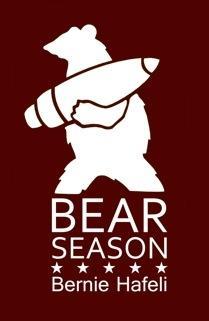We are delighted to welcome Bernie Hafelo, author of Bear Season, who joins us to share a guest post and excerpt.
Guest Post
My thanks to Donna and David for suggesting I contribute a post to their site.
I started becoming a serious fiction writer in late 2001, shortly after I was sacked by the advertising agency I worked for. At the time I was 51 years old, and with the unaccustomed luxury of time on my hands, I began trying to write short stories, something I’d always wanted to do but never had the time, or perhaps the nerve, to attempt. Life was slipping away, right? Time to get going. Aided by Madison Smartt Bell’s Narrative Design, I actually published a couple stories, two hopeful lights illuminating the dark fugue of rejection. Buoyed by meager success, I decided to apply to grad school and, somewhat serendipitously, was accepted at The University of San Francisco, a program that allowed me to attend classes at night, an important consideration since I was by now working again.
Eventually, I graduated. Now I had a novel and soon an agent who shopped the novel to over forty publishing houses. Although we received a few nice letters, the novel was rejected every time. My agent despaired. The economy was in a freefall not conducive to the publication of first-time novelists. By now I was working on a second novel and I was undeterred. When I finished, I showed my agent. The novel showed growth, she said, I was writing with more confidence and the story was unique. “But,” she went on, “given the market and the fact this is even bleaker than your first novel, I don’t see how I can sell it.” She told me she was sorry but she would no longer be representing me, not just me but any of her fiction clients. I can’t say I blamed her. She’d put a lot of time and effort into promoting my book. “Bleak” had been the most common criticism in all the rejection letters. For a while I was in the dumps.
However.
During the time I was writing the first two novels, my girlfriend Jinko had told me about a website featuring the exploits of Wojtek, the legendary Soldier Bear of WWII. “Write about Wojtek,” she said. “He’s not bleak.” Intrigued, I filed Wojtek away as I continued working on my two so far unsalable novels, at the same time keeping a brain module open for devising ways of expanding the Wojtek story, so I wasn’t merely fictionalizing a series of already amazing true-life events. At some point I came up with a plan. Now I had time to put it on paper.
I started writing. Compared to the novels, the words came easy. I was writing in the first person for one thing, not shifting points of view between multiple narrators. I’d envisioned a 50 or 60 page novella but it grew to over 150 pages. I’d become quite fond of the characters, always a good sign. When I finished, I sent the story to some small press publishers. Without an agent, the field narrows drastically. There were some rejections. But then a brave, kind soul published it. Published it! I was now a published author, something I’d had grave doubts would ever happen.
What stands out for me in all this—both in how I became a writer and in how I became published writer—is how a seemingly bad experience (losing a job, having a novel rejected, losing an agent) paved the way for an extremely good experience. I’m sure this happens all the time, but in my life before fiction writing I rarely, if ever, noticed it. Now I’m on the lookout all the time. To paraphrase Henry James, “A writer should be someone on whom nothing is lost.”
Excerpt from Bear Season
At nine o’clock the next morning we were roused by a rap at the window. By nine-thirty Nigel was behind the wheel and we were on the road to Edinburgh. It was still raining off and on, the clouds an advancing fleet of purple and gray reflected in the road water, bloated and woozy, like the whole world had a sickness. After a few miles, a band of salmon-colored sky formed on the horizon, resembling a thick slab of lunchmeat sandwiched between the earth and clouds.
“Look at that,” said Nigel, pointing at the ribbon of light. “You might have sun in Edinburgh. A rare occurrence.”
The ride had been quiet up to then. Nigel’s attempts to engage my uncle had been met with grunts of assent or denial, or the kind of empty response that discouraged further discussion. My uncle was hung over. To fill the silence, Nigel turned on the radio and found a dance hall band; the Guy Lombardo tune recommended enjoying yourself before it’s too late.
“What brings you to Edinburgh?” Nigel asked after a few minutes of chipper music, not to be dissuaded. He wore one of those hats with a snap on the brim, pulled low over his forehead. His skin was white as a fish belly.
“I’m seeing an old war buddy,” Uncle Izzy said.
“You were in the war? Fighting Jerry?”
My uncle said that he was. Particulars were exchanged; Nigel had also been in the war, a tail-gunner on bombing raids over Germany. He’d been shot down on one occasion.
“That was no bloody picnic, mate. Eight months POW. I wouldn’t wish it on anyone.”
“I know what you’re talking about.”
“You were captured too?”
My uncle admitted he was.
“Where’d they stick you?”
“You’ve never heard of it. It wasn’t the Nazis. It was our enemy who became our ally and is our enemy again.”
“The Bolshies?”
My uncle nodded.
Nigel slowly shook his head. “May they burn in a red hell of their own making.”
“Like you said, it was no bloody picnic.”
Uncle Izzy sighed then, and looked out his window at the sodden fields. For a while we rode in silence, except for the jaunty songs coming from Nigel’s radio, which felt inappropriate now, like jugglers at a funeral. On a grassy hillside lingered a small herd of cows. They appeared scrawnier than the ones in Ohio.
“Who’s this buddy you’re seeing?” Nigel asked. “Was he a prisoner too?”
During the entire drive my uncle hadn’t once mentioned Wojtek. I suppose he was worried about Nigel’s reaction, or just tired of talking about the soldier bear.
“You could say he’s a prisoner now,” my uncle said, giving me a look then glancing back out the window. In the brief second I held his gaze, my eyes implored him to go no further, to resist telling the tale I thought might be forthcoming, where Wojtek steals the cans of peaches from the sleeping soldiers, which would lead of course to Wojtek stealing the panties of the women from the Women’s Signal Company, wrapping them around his head, and parading around camp. This story would appeal to Nigel on a number of levels, my uncle might think, and he could have been right if Nigel were to believe my uncle. I was afraid he wouldn’t, that instead he’d think him a barmy nutter and drop us both off in the piddling rain that had again started falling.
“That’s a queer thing to say,” Nigel said. “Are you speaking metaphorically?”
My uncle looked at Nigel, then tapped me on the knee. “Do you hear that, Czeslaw? British truck drivers are more intelligent than American truck drivers, wouldn’t you say?”
When I nodded, Nigel lifted the corner of his mouth in a smile.
“Look!” he shouted then, pointing out his side window, which he’d just wiped clean of condensation using the sleeve of his jacket.
In the distance, arching from a grove of dark, wind-tossed trees to a point miles away where the landscape escalated into copper hills, was a rainbow. It stood out like neon against the gray-backed sky.
“You’ll have the blessings of the fairies,” Nigel said.
“Your endeavors in Edinburgh will meet with success.”
“Good,” my uncle told him. “We need all the help we can get.”
About Bear Season (2013)

Guest Post and Excerpt: Bear Season – Bernie Hafelo | Thank you for reading Tweedle Dee and Tweedle Dave







